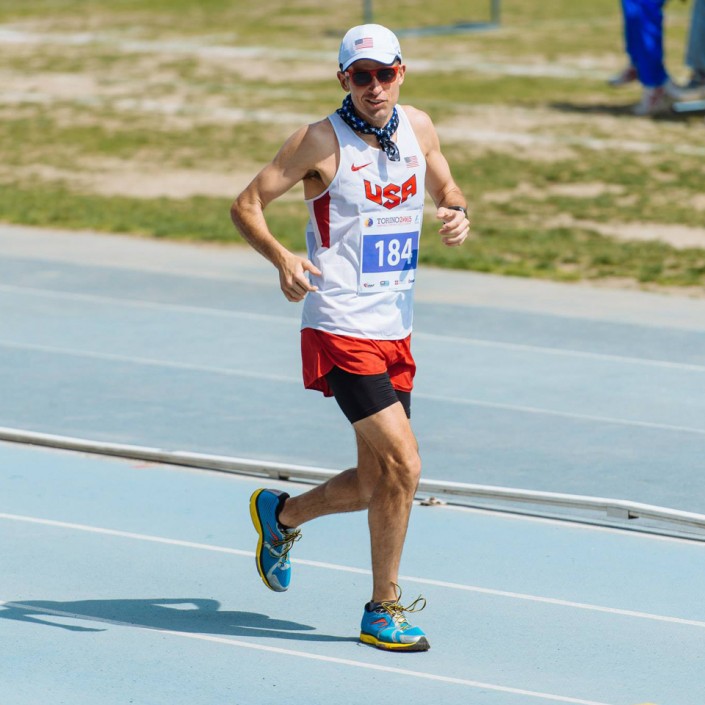ADHD Awareness Campaign
Marathon Des Sables
Hope So Bright assembled an elite team of runners, Team IRun4Ultra, which ran to support ADHD awareness in the April 2016 Marathon des Sables (MdS) in Morocco. MdS, an annual ultra marathon, is a grueling, multi-stage race through a formidable landscape in one of the world’s most inhospitable climates, the Sahara Desert. The rules required the runners to be almost entirely self-sufficient by carrying on their backs everything except the water needed to survive. Athletes were given a place in a tent to sleep at night, but all other equipment and food had to be carried.
Representing Hope So Bright and its ADHD campaign were five ultra trail marathoners from around the world, that comprised Team IRun4Ultra. They included: Marco Olmo (from Italy), Harvey Lewis and Jason Schlarb (from the US), Ricardo Mejía Hernández (from Mexico) and Carlos Sá (from Portugal). The Marathon des Sables is the equivalent of 5.5 marathons. Our elite team took second place in the race this year and made a difference for children suffering with ADHD worldwide!
Renowned psychiatrist, Dr. Allen Frances, Professor of Child Psychiatry at Duke University, Durham, North Carolina, served as chair of the DSM IV (Diagnostic and Statistical Manual of Mental Disorders) task force. The following is from his commentary, “Why So Many Epidemics of Childhood Mental Disorder?” published in the 2013 Journal of Developmental and Behavioral Pediatrics:
Since the publication of DSM-IV in 1994, the rates of three mental disorders have skyrocketed: attention deficit disorder (ADD) tripled, autism increased by 20-fold, and childhood bipolar disorder by 40-fold. It is no accident that diagnostic inflation has focused on the mental disorders of children and teenagers. These are inherently difficult to diagnose accurately because youngsters have a short track record; are in developmental flux that makes presentations transient and unstable; are sensitive to family, peer, and school stresses; and may be using drugs. If ever diagnosis should be conservative, it should be in kids. Instead, we have experienced an unprecedented diagnostic exuberance encouraged in part by DSM-IV, but mostly stimulated by the powerful external forces of drug company marketing and the close coupling of school services to a diagnosis of mental disorder. 3
Responding to Dr. Frances’ commentary, pediatrician, Claudia M. Gold, MD, adds:
The challenge…is to avoid over-diagnosis, while at the same time, not under-treating those who need help. Most of the children who receive these labels, and their families, are struggling in significant ways. They do need help, and sometimes lots of it. The issue is inextricably linked with the need to “name” the problem, a need comes in part from both clinicians and parents, who may feel more of a sense of control if what they are struggling with has a name, and also insurance companies who require a diagnosis for reimbursement of services. Psychiatric diagnoses in children, by definition, place the problem squarely in the child, when in fact it is almost always more complex than this. Genetic vulnerability and environment both have an important role to play. 4
“Naming” the problem also makes it far easier for pharmaceutical companies to advertise that their medications are effective treatments for this supposed “epidemic”. Dr. Frances adds that three years after DSM-IV was published, drug companies introduced new and expensive on-patent drugs that provided the incentive and resources for an aggressive marketing campaign to psychiatrists, pediatricians, and family doctors. Simultaneously, successful drug company lobbying gave them unrestricted freedom to advertise directly to consumers. Parents and teachers were inundated with the message that ADD was terribly underdiagnosed and easily treated with a pill. Sales of Attention Deficit Disorder (ADD) drugs ballooned to an astounding $7 billion. 5
————————————-
An Open Letter to Parents and Caregivers of Children with ADHD and autism:
The main problem lies with the medication itself — powerful drugs should be used only as a last resort and always in conjunction with behavioral therapy. Historically, however, instead of first offering parents the option of therapies such as Cognitive Behavioral Therapy (applied behavioral analysis), American doctors have been prescribing powerful, highly addictive anti-psychotics and stimulants before trying less-invasive methods. Not only are these drugs highly addictive, they are riddled with negative side effects. Though drug companies have received billion-dollar fines for off-label marketing to kids, the fines pale in comparison to the enormous revenues made from the sale of these drugs.
While pharmaceutical companies have enjoyed profits, it is our children who suffer. The inappropriate use of anti-psychotics and stimulants are most pronounced among children who are economically disadvantaged and those in foster care. Instead of identifying the real reason that kids are acting up, an unnecessarily high number of children are being over-medicated. Hope So Bright’s awareness campaign attempts to shed light on the serious flaws of the healthcare system and to offer solutions.
Cognitive Behavioral Therapy (Cognitive Behavioral Therapy) is an effective, non-pharmaceutical method proven to make a world of difference for children with ADHD. It allows an individual child to learn to create a custom, systematic teaching strategy rewarded with positive reinforcement to create lasting, meaningful changes in behavior. According to Autism Partnership, a leading authority on Cognitive Behavioral Therapy:
Cognitive Behavioral Therapy employs teaching where the objectives of intervention are to teach your child those skills that will facilitate his development and help him achieve the greatest degree of independence and the highest quality of life possible. Although many different techniques comprise Cognitive Behavioral Therapy the primary instructional method is called Discrete Trial Teaching (DTT). DTT involves breaking a skill into smaller parts, teaching one sub-skill at a time until mastery, allowing repeated practice in a concentrated period of time, providing prompting and fading as necessary and using reinforcement procedures.5
Every child with ADHD deserves the chance to learn these skills, don’t you think? Your support will give children with ADHD and their families the hope they desperately need. Because proper non-pharmaceutical treatment programs are rare, funding through traditional sources has been limited. This makes your contribution even more important. Please support Team IRun4Ultra in its efforts to allocate proper treatment and to spread awareness for those who live with ADHD.
Thank you,
Linda Sanders
Founder/CEO, Hope So Bright
- Bloom B, Jones LI, Freeman G. (2013). Summary health statistics for U.S. children: National Health Interview Survey, 2012. National Center for Health Statistics. Vital Health Stat 10, 4. Retrieved from http://www.cdc.gov/nchs/data/series/sr_10/sr10_258.pdf
- Schwarz A, Cohen S. (2013, March, 31) A.D.H.D. Seen in 11% of U.S. Children as Diagnoses Rise. New York Times, p. A1. Retrieved from http://www.nytimes.com/2013/04/01/health/more-diagnoses-of-hyperactivity-causing-concern.html?_r=0
- Frances A, Batstra L. (2013) Why So Many Epidemics of Childhood Mental Disorder? Journal of Developmental and Behavioral Pediatrics, 3 (4), 291-292. Retrieved from http://journals.lww.com/jrnldbp/Citation/2013/05000/Why_So_Many_Epidemics_of_Childhood_Mental.12.aspx
- Gold, CM. (2013) Too many Psychiatric Diagnoses for Children: an Epidemic of Labels. Retrieved from https://www.boston.com/lifestyle/health/childinmind/2013/06/too_many_psychiatric_diagnoses.html?utm_campaign=coschedule&utm_source=twitter&utm_medium=hopesobright
- Cognitive Behavioral Therapy (Cognitive Behavioral Therapy). (2015). Autism Partnership. Retrieved from http://www.autismpartnership.com/applied-behavior-analysis
Stay Informed
With a Free Subscription to Hope So Bright’s Newsletter!

Address: 2711 N. Sepulveda Blvd #414 • Manhattan Beach, CA 90266-2725
Email: hopesobright@gmail.com
Phone: 310.374.2862
Website: www.hopesobright.org





